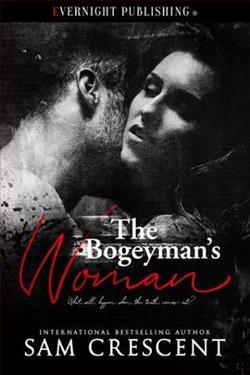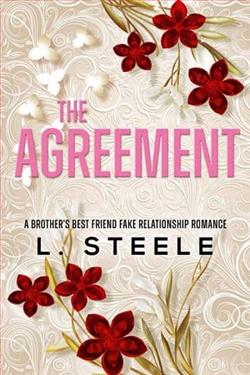Page 5 of Rules for Rule Breaking
“Most of our friendship has been long distance,” Winter said. “And Emmy is going to come back for college. She’s kind of artsy. I could see her going to Emerson if they have a dance program. Then we’ll get to live in the same city for once.”
“Did she tell you she wants to go to Emerson?” Halmeoni asked, arching one brow. “College is an important decision. You need to let her make her own choices.”
“Well, no. But you know how she is. I’ll probably have to do her applications for her. And what is this lecture? You’re the one who won’t even talk about Nai Nai. I miss her too, you know.”
Winter smiled as she remembered how she and Emmy would run around and play together while their grandmothers watched from the senior center, communicating in an odd mix of pidgin English and hand gestures because Nai Nai only spoke Mandarin. Both women were widows, and because they never forced the other to talk about their husband, they grew close. Their bond was built through shared grief, on a strong foundation of peace and quiet.
“Only you young people act like you are constantly in confession. I don’t need to talk about every single feeling I have.”
Winter stiffened. “Can you at least start coming to Sunday dinner again?”
“If I step into that house, your father will never let me leave.”
“He’s just worried about you living alone now that Nai Nai is gone.”
“I don’t live alone. I’m in a community of people my own age.”
This wasn’t Winter’s battle. Truthfully, she liked that Halmeoni had independence. But, with Halmeoni aging, Appa wanted her to move into the house. It only bothered her that Halmeoni had begun skipping Sunday dinners to avoid Appa, and Winter missed having the whole family together.
Not wanting to provoke Halmeoni any further, she asked hopefully, “Can you take me to visit MIT, then?”
“I can’t sit on a plane for that long. And I have things to do here,” Halmeoni replied.
Winter looked around, trying to figure out what her grandmother could possibly have to do. The senior center was a sea of gray hair, flesh-colored orthopedic shoes, and newspapers enjoyed over muddy cups of coffee or watered-down tea. Winter didn’t even know where you could buy a newspaper anymore. She didn’t want to offend her grandmother, so she didn’t inquire about her plans. “Bobby is best served in small doses, and our parents are constantly forcing us together,” Winter said instead. “He’s so... uptight.”
“You’reuptight, Soon-hee,” Halmeoni clapped back. “You need to relax and stop trying to control everything. If you want to have a terrible time, you’re going to have a terrible time.”
Winter clutched her metaphorical pearls. “Halmeoni!”
“You and that boy never relax. It’s always a contest with you. I admire your hard work, but you’re sixteen and it’s your summer break. After you graduate, those next four years will be hard. Don’t start now.”
From everything her father had ever told her, Halmeoni was notthe type of parent to tell anyone to relax. She was the kind of parent to shame her children into doing things by telling stories about waking up at five a.m. to feed chickens. To this day, Winter didn’t know if that was true. She couldn’t imagine her grandmother in a chicken coop with all her expensive handbags and silk scarves. Although she was a doting mother by all accounts, Halmeoni had been strict on her children when it came to academics, particularly Appa, her oldest son. So much so that he went to med school to be a dermatologist rather than a veterinarian like he wanted. Halmeoni didn’t think that veterinarians were real doctors. Harabeoji had been the more lenient one, but he passed away when Winter was only six. According to Appa, Harabeoji’s death took a toll on Halmeoni, and she softened up considerably.
“I’m happy the way I am, Halmeoni,” Winter said after a little while. “I can have fun after school, when I get the job I want.”
She did admit that at times she wished that not every minute of her day was accounted for—the band practices, club meetings, competitions, debates, tournaments, and whatever else she packed her calendar with. But if being uptight would get her into MIT and bring her closer to the life she wanted, then so be it. As long as no one saw the effort she put in. Especially Bobby Bae. She didn’t need to give anyone any reason to doubt she deserved her spot. Unlike Bobby Bae, she didn’t have the luxury of being an insufferable workhorse and know-it-all with his hundreds of tutors and bread crumb trails of flash cards and tears wherever he went.
Halmeoni pursed her lips. “Okay, Soon-hee.”
Winter anxiously bounced her leg as she awaited Bobby’s arrival. She half expected him to spring out of the ground and immediately launch into one of his self-aggrandizing rants about Winter’s “laissez-faire” attitude. Halmeoni put her hand on Winter’s leg to stop her.
“You’ll shake out the luck,” she said.
“What if I shake out the bad luck?” Winter replied, and kept on bouncing.
She took a long sip of her bitter tea, and her gaze settled on the gigantic windows. It was then that she spotted Bobby Bae. He haphazardly pulled into a space in the black Nissan SUV his parents had given him for his seventeenth birthday. He hopped out of the car and tossed his hair back out of his eyes as he was known to do. Winter didn’t see why he didn’t cut it. He’d hurt his neck one day. Not that she cared. It just seemed impractical, and Bobby Bae was the most practical person she’d ever met. He didn’t seem vain enough to care about something like hair. He wore a different variation of the same outfit every day like he was Steve Jobs’s more neurotic twin.
They locked eyes, and the theme song that plays in every Western cowboy movie when there’s about to be a showdown started in Winter’s head.
“Be nice,” Halmeoni warned as Bobby entered.
Bobby located his target and came right up to her.
“Winter,” he said.
“Robert.”
Bobby scrunched up his entire face until he had a Pangaea of features glaring back at the girl in front of him. “Why can’t you call me Bae like everyone else?”















